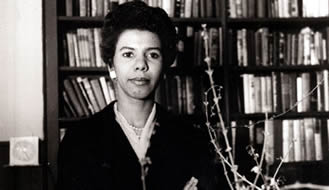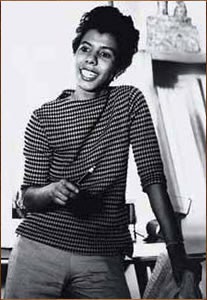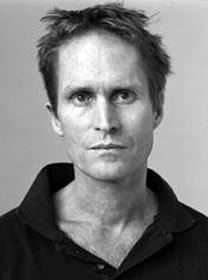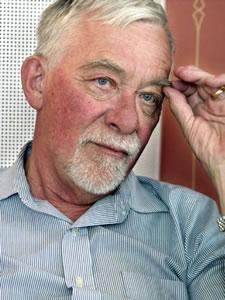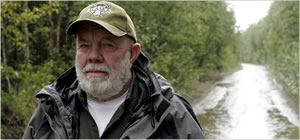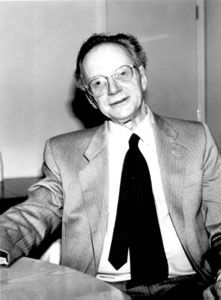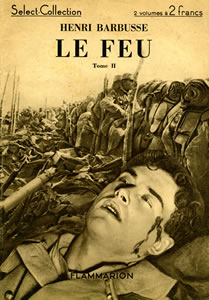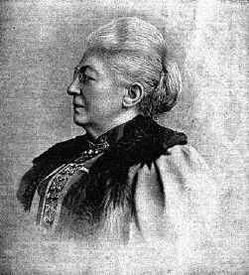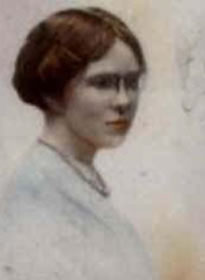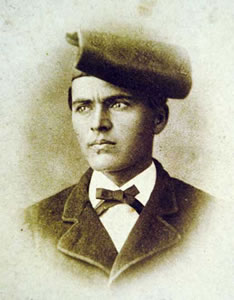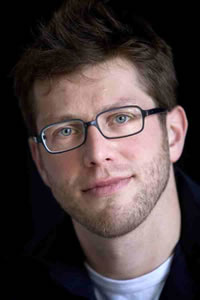De Indiase dichter en schrijver Ruskin Bond werd geboren op 19 mei 1934 in Kasauli. Zie ook alle tags voor Ruskin Bond op dit blog.
Hip Hop Nature Boy (Fragment)
When I was seven,
And climbing trees,
I stepped into a hive of bees.
Badly stung and mad with pain,
I danced the hip-hop in the rain.
Hip-hop, I’m a nature boy,
Mother Nature’s pride and joy!
When I was twelve,
Still climbing trees,
I fell instead-
And landed on my head.
Feeling lighter,
I thought I might become a writer.
Hip-hop, dancing in the rain,
A nature-writer I became!
With Nature being my natural bent,
At twenty I took out my tent,
And spent the night beside a Nadi,
Wearing only vest and chuddee.
At crack of dawn I woke to find
A crocodile was close behind,
And smiling broadly!
In times of crises at my best,
I did not trouble to get dressed,
But fled towards the Gulf of Kutch,
With fond salaams to muggermuch!
Mother Nature once again
Found me dancing on the plain,
Nanga-Panga in the rain!
Growing older, even bolder,
Took a winding mountain trail,
Up a hill and down a dale,
All to see a mountain-quail.
The quail was extinct, long expired,
I was limping, very tired;
Thought I saw a comfy cot
In the corner of a hut.
Feeling grateful, I sank down
Upon a blanket soft as down.
Blanket rose up all at once,
Gave a shudder, then a pounce.
Stumbling in the darkness there,
I’d be disturbed a big brown bear!
I did not stop to say goodnight,
But fled into the open night.
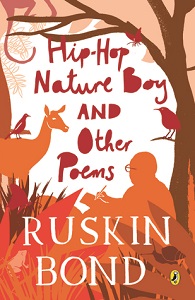
Ruskin Bond (Kasauli, 19 mei 1934)
Cover
De Deense dichter van Palestijnse afkomst Yahya Hassan werd geboren 19 mei 1995 in Aarhus. Zie ook alle tags voor Yahya Hassan op dit blog.
WOORDEN
JULLIE ZIEN ELKAAR OP EEN FOTO
EN VLUCHTEN
EERST DE EEN DAN DE ANDER
NAAR EEN LAND WAAR MEN TONGZOENT OP STRAAT
EN ZO KOMEN WIJ DWARS HET UNIVERSUM BINNEN
WANNEER WAREN JULLIE VOOR HET LAATST VEILIG
DE OORLOG ZIT NOG IN JULLIE
EEN TANDELOZE JAP OP NUMMER 8 ZEGT NOOIT WAT
IK LEVER HET VARKEN NIET UIT
HET VARKEN WIL WEG
MAAR HET VARKEN AARZELT NOG EVEN
DE OMSTANDIGHEDEN ZIJN EEN KLAP IN JE GEZICHT
NIET AL DIE PRAATJES AL DIE TAAL
Vertaald door Lammie Post-Oostenbrink

Yahya Hassan (Aarhus,19 mei 1995)
De Duitse schrijver en vertaler Fritz Rudolf Fries werd geboren op 19 mei 1935 in Bilbao als zoon van een Duitse koopman. Zie ook alle tags voor Fritz Rudolf Fries op dit blog.
Uit: Last Exit to El Paso
„Der Alte kann es nicht vermeiden, durch seine Brillengläser auf die gut gerundete, milchkaffeefarben gebräunte Gestalt zu schauen, soweit seine Lesebrille das Bild hergibt.
Sein Verdacht hat sich längst bestätigt. Ihre Anstellung als Pflegeschwester (bei Nachweis medizinischen Grundwissens), als Köchin und Sekretärin war nur Vorwand für eine Magisterarbeit. Eine Magisterarbeit im Auftrag welcher Geheimdienste? Im Alter vergrößert
sich das Misstrauen. Ihr Interesse gilt jenem Pierre Arronax und seinen Publikationen im Schnittpunkt zweier Systeme. Die Systeme mit ihren feindlichen Ideologien haben Schiffbruch erlitten. Was bleibt, ist das Werk, so eines vorhanden.
Kathleen hält ihm das Telefon ans Ohr. Die Bedingungen für die Weltreise? Aber am anderen Ende der Leitung ist sein Freund Arcimboldi – auch dieser Name ein Pseudonym und mehr noch, eine bösartige Anspielung auf einen alten Mann, der weniger aus Äpfeln und Birnen,
Blumen und Kohlköpfen zusammengesetzt ist, wie sie der Maler Arcimboldi einst malte, denn aus den Ersatzteilen einer himmelwärts fortschreitenden Medizin, für die der Übergang vom Menschen zum Roboter kaum noch eine Frage der Zeit ist.
Archie also, for short. Wie immer beginnen seine Worte mit einem glucksendem Lachen, das um Nachsicht zu bitten scheint für das, was nun folgt.
Du wirst es kaum glauben, sagt er. Mich ruft doch eben jemand an und sagt, ich hätte eine Weltreise gewonnen! Einen Partner oder eine Partnerin könne ich mitbringen, die Bedingungen würden noch bekannt gegeben. Es geht wohl darum, einen gewissen Punkt auf der Erde in einer vorgeschriebenen Zeit zu erreichen, um eine Prämie zu kassieren. Meine Frau weigert sich jetzt schon, mitzukommen. Umso besser. Auf Reisen überfiel sie jedes Mal die Lust zu gähnen, sodass ich immer dachte, sie verschluckt die fremde Landschaft samt ihren
Menschen. Wie wär’s mit deiner Frau?
Eingedenk ihrer hinter einer Mauer verbrachten Jugend, sagt der alte Mann, kam sie aus dem Staunen nicht heraus. Für sie war die Fremde noch die Fremde. Nimm doch, schlägt er vor, deinen Sohn Piet mit auf die Reise.“
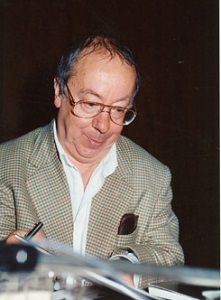
Fritz Rudolf Fries (19 mei 1935 – 17 december 2014)
De Amerikaanse schrijfster Lorraine Hansberry werd geborenop 19 mei 1930 in Chigago. Zie ook alle tags voor Lorraine Hansberry op dit blog.
Uit: A Raisin in the Sun
“MAMA (Walking away from BENEATHA, too disturbed for triumphant posture. Stopping and turning back to her daughter) There are some ideas we ain’t going to have in this house. Not long as I am at the head of this family.
BENEATHA Yes, ma’am.
(MAMA walks out of the room)
RUTH (Almost gently, with profound understanding) You think you a woman, Bennie—but you still a little girl. What you did was childish—so you got treated like a child.
BENEATHA I see. (Quietly) I also see that everybody thinks it’s all right for Mama to be a tyrant. But all the tyranny in the world will never put a God in the heavens!
(She picks up her books and goes out. Pause)
RUTH (Goes to MAMA’s door) She said she was sorry.
MAMA (Coming out, going to her plant) They frightens me,
Ruth. My children.
RUTH You got good children, Lena. They just a little off sometimes—but they’re good.
MAMA No—there’s something come down between me and them that don’t let us understand each other and I don’t know what it is. One done almost lost his mind thinking ’bout money all the time and the other done commence to talk about things I can’t seem to understand in no form or fashion. What is it that’s changing, Ruth.
RUTH (Soothingly, older than her years) Now … you taking it all too seriously. You just got strong-willed children and it takes a strong woman like you to keep ’em in hand.
MAMA (Looking at her plant and sprinkling a little water on it) They spirited all right, my children. Got to admit they got spirit—Bennie and Walter. Like this little old plant that
ain’t never had enough sunshine or nothing—and look at it …
(She has her back to RUTH, who has had to stop ironing and lean against something and put the back of her hand to her forehead)
RUTH (Trying to keep MAMA from noticing) You … sure … loves that little old thing, don’t you?…”
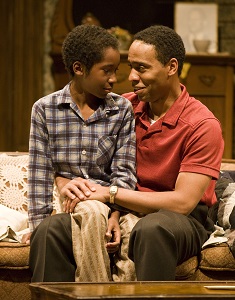
Lorraine Hansberry (19 mei 1930 – 12 januari 1965)
Scene uit een opvoering in Los Angeles, 2011
De Duitse schrijfster Rahel Varnhagen werd geboren op 19 mei 1771 in Berlijn. Zie ook alle tags voor Rahel Varnhagen op dit blog.
Uit: Gedanken, Beobachtungen und Erinnerungen
„Dann hab ich gestern abend bemerkt, daß, ganz umgekehrt, wie man denken sollte, Leute, die sich häufig Ausreden bedienen, und denen Lügen nicht fremd und zuwider sind, und seit Kindheit eine gangbare, in Gebrauch stehende Münze in ihrer Tasche, eben die sind, denen man ohne Vorbereitung, ohne wahre Hoffnung sie zu betrügen, etwas weismachen kann; ganz leicht! Ich habe es mir auch schon erklärt. Diese Menschen sind immer mit kleinen Geschichten des Tages ganz beschäftigt – die ihre kleinen Lügen selbst immer propagieren -, von Äußerlichkeiten so eingenommen, daß sie auf der Menschen Wesen, Stimme, Ton, Blick, Mienen, Haltung, Seele und Art wenig merken, oder schief! und besonders halten die Elenden Ausflüchte und Behelfe für wahre Klugheit,die sie andern sehr selten zutrauen; besonders Phantasten nicht, wie sie innigere Menschen nennen. Dies ist sehr wahr.
Menschen ohne Sitten (aber nicht, wie sie beim Tee davon sprechen) sind die wahre Geißel der andern. Daher kommt alles! Was kann man denn wohl mit einem tauben, vertäubten Gewissen begreifen und fassen; und mit einem matten stockigen Herzen. Und sie tragen alle face humaine! (Menschlich Angesicht. Daß aber Gesicht im Französischen eher kommt, ist besser.) Man sollte die Fratzen und Schreckbilder sehen, wenn sie aussähen, wie sie sind. Kommt das nie? Mich dünkt, das wäre ein Schritt.
Daß in Europa Männer und Weiber zwei verschiedene Nationen sind, ist hart. Die einen sittlich, die andern nicht; das geht nimmermehr!
Ich bin wie der Prinz in der Zauberflöte. Ich poche an alle Tempel, da ich nicht gestorben bin vom ersten Zurückweisen. Und man kann nicht sagen, wie der kranke Hamlet: »Ist es edler, dulden oder mutig dem Spiel ein Ende machen«: sondern, edel ist, eine Übersicht über seine eigene Natur und die Umstände, die uns umgeben, zu behalten; und mit Bewußtsein und Schmerz entbehren; und mit Bewußtsein im Genuß genießen; auf alles, und sogar auf eigene Rückfälle, gefaßt sein; und an Entwicklung glauben.“
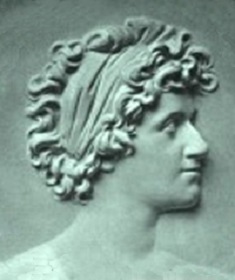
Rahel Varnhagen (19 mei 1771 – 7 maart 1833)
Rond 1796 (bas-reliëf door Friedrich Tieck)
De Britse schrijfster Anna Jameson werd geboren op 17 mei 1797 in Dublin. Zie ook alle tags voor Anna Jameson op dit blog.
Uit: The Diary of an Ennuyée
Sept. 3.—A terrible anniversary at Paris—still ill and very weak. Edmonde came, pour me désennuyer. He has soul enough to bear a good deal of wearing down; but whether the fine qualities he possesses will turn to good or evil, is hard to tell: it is evident his character has not yet settled: it vibrates still as nature inclines him to good, and all the circumstances around him to evil. We talked as usual of women, of gallantry, of the French and English character, of national prejudices, of Shakspeare and Racine (never failing subjects of discussion), and he read aloud Delille’s Catacombes de Rome, with great feeling, animation, and dramatic effect.
La mode at Paris is a spell of wondrous power: it is most like what we should call in England a rage, a mania, a torrent sweeping down the bounds between good and evil, sense and nonsense, upon whose surface straws and egg-shells float into notoriety, while the gold and the marble are buried and hidden till its force be spent. The rage for cashmeres and little dogs has lately given way to a rage for Le Solitaire, a romance written, I believe, by a certain Vicomte d’Arlincourt. Le Solitaire rules the imagination, the taste, the dress of half Paris: if you go to the theatre, it is to see the “Solitaire,” either as tragedy, opera, or melodrame; the men dress their hair and throw their cloaks about them à la Solitaire; bonnets and caps, flounces and ribbons, are all à la Solitaire; the print shops are full of scenes from Le Solitaire; it is on every toilette, on every work-table;—ladies carry it about in their reticules to show each other that they are à la mode; and the men—what can they do but humble their understandings and be extasiés, when beautiful eyes sparkle in its defence and glisten in its praise, and ruby lips pronounce it divine, delicious; “quelle sublimité dans les descriptions, quelle force dans les caractères! quelle âme! feu! chaleur! verve! originalité! passion!” etc.
“Vous n’avez pas lu le Solitaire?” said Madame M. yesterday. “Eh mon dieu! il est donc possible! vous? mais, ma chère, vous êtes perdue de réputation, et pour jamais!”
To retrieve my lost reputation, I sat down to read Le Solitaire, and as I read my amazement grew, and I did in “gaping wonderment abound,” to think that fashion, like the insane root of old, had power to drive a whole city mad with nonsense; for such a tissue of abominable absurdities, bombast and blasphemy, bad taste and bad language, was never surely indited by any madman, in or out of Bedlam: not Maturin himself, that king of fustian, “——ever wrote or borrowed Any thing half so horrid!” and this is the book which has turned the brains of half Paris, which has gone through fifteen editions in a few weeks, which not to admire is “pitoyable,” and not to have read “quelque chose d’inouie.”
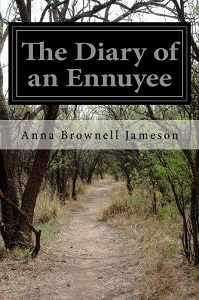
Anna Jameson (17 mei 1794 – 17 maart 1860)
Cover


